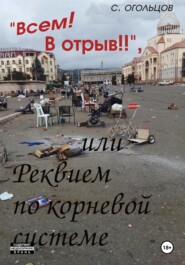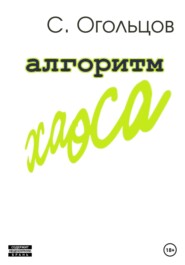По всем вопросам обращайтесь на: info@litportal.ru
(©) 2003-2024.
✖
The Rascally Romance (in a single helluva-long letter about a flicking-short life)
Настройки чтения
Размер шрифта
Высота строк
Поля
Besides, another 100-apartment block was finished in summer. A bricklayer from our team, named Nina, a fat woman with a hairy birthmark on her cheek, got an apartment in it. She entered SMP-615 a couple of months before the commissioning of the apartment block and, having received the apartment, quit the organization.
I went to the personnel department and asked Petukhov about my progress in the queue for improving my housing conditions. He answered I was number 35 in it.
That's ridiculous! 6 years before, I was 24th in the line!
He replied with calligraphic roundness: since those times 3 bosses replaced each other, and he, personally, was not around when I got a job at SMP-615, so now my place in the list was thirty-fifth and no other data to refer to…
Fare thee well, my beloved construction train! Farewell, our team! I won't set on fire our trailer, even though my guitar, brought for celebrating Grynya's birthday, the next morning was not there…
~ ~ ~
When the last entry in the workbook ran "on strength of Article", you became a sort of blacklisted – no organization had any job for you. However, in Konotop there was an enterprise not overly afraid of outcasts, "Rags" was the name of the brave company, aka recycling factory.
On the strength of my basic specialty, they gave me the job of a workman at the overhaul unit. All of the overhaul consisted of 3 workmen, but we did not do any major repair, neither any repair at all for that matter. We sat in the room, idling the time and occasionally went out into the yard of the factory full of stacks of modern recycling equipment brought there a year or, maybe, 2 before and protected from the weather vagaries by a giant all-embracing cover of black roofing felt, because the building for the equipment had not been finished yet. The factory itself huddled in a pair of barrack-like structures, offspring from the era of the first five-year plans, plus a couple of huge arched Quonset Huts made of corrugated white tin, and several various huts and sheds leaning against the wall around the factory grounds.
But at the very beginning of my overhaul career, I was not bored with all that bleakness because they sent me on a business trip to the city of Kiev… The then Secretary of the Central Committee of the Communist Party of the Ukrainian Soviet Socialist Republic, Comrade Shcherbitsky, was going to visit the Kiev Recycling Factory to share his valuable instructions on the development of so important a branch in the national economy. As a result, the recycling factories from all over the Soviet Socialist Republic of Ukraine started sending their workmen to Kiev to spit and polish the metropolitan recycling enterprise in preparation for the high-ranking visit.
When I arrived to make my contribution, the metal structures in the shop floors of the factory had been paint-coated for the fourth time already, and the factory yard freshly covered with the third layer of asphalt… They were the farewell days of golden autumn, the sun smiled affectionately from the calm sky, but the sight of the small Fir trees in stone pots, like, to decorate the courtyard called for the blues to set in. The insufficient capacity of the pots would not allow for the trees to grow, they were condemned to perish unavoidably after the pompous visit…
Before leaving for the business trip, I went to the Konotop Department Store to buy a sports-bag for keeping personal necessities. As it turned out, there was a fit of shortage for such bags and I had to buy a smaller, though practical, one instead. However, if you observed closely enough, it was, like, a female goods item. Might I've been a pervert after all?.
For the stay in Kiev, I was billeted at a boarding house near the "Pipe", on the very bank of the Dnieper river. Before the war, there was a plan to cross the Dnieper at that place by a metro line. They even managed to build a stop of reinforced concrete, which looked like a giant pipe indeed, with the diameter as tall as a two-story house. Later, the circumstances and plans got changed and the "Pipe" was covered with all sorts of "here were Osya and Kisa" and the like historical stamps.
The boarding house was a long one-story timber structure with pencil-box rooms, like in the hostels, only the windows were wider. In the mornings I went out on the sandy bank of the mighty stream to do exercises among the bushes. To watch the Dnieper from so a-near was not like taking looks from a local train flying over it along the bridge. The oceanic mass of water rolling before your eyes was simply stunning.
…and so without a stop day after day… one-two… millennium upon millennium… three-four… bend left… bend right…
In the room, besides me, there lived a blond fella from Southern Ukraine with a graphical story of how he was stabbed on the beach. The homie bros from the same neighborhood jabbed a knife in his stomach and he fell on his back. And then the precinct approached. The guys pretended playing cards, and they just threw an open newspaper over the knife handle sticking up from his stomach. The militiaman started asking about something, and the blond lay and looked, and couldn't squeeze a word out, and flies were landing and racing over the newspaper.
The guys, naturally, "Nah, we know nothing." When the precinct left they called the ambulance because he had not knocked on them…
There was almost no renovation work left to be done at the factory, and the business trippers were just sitting in the Red Corner room, where the young and bearded artist, a local hombre, wrote out the letters of one and the same slogan, day after day, on one and the same long strip of red fabric spread over along a very long table, or gossiping with his friends, also Kievers, who knew ways of getting in for a visit thru the guarded check-entrance.
We changed clothes right there, into fresh spetzovkas given out by the factory, and hung our rigs onto the chair backs. The shower was working around the clock, round the corner down the corridor – some halcyon days in full swing. My fellow-business-trippers were amazed at my talent of sitting in the same position and never strolling about the Red Corner, nor partaking in the mutual idle gossip but only listening and watching in a modest, still, and silent way…
After another of working days, I returned to the boarding house and got it that the blond was thru his business trip and went home because only my bed remained in the room, and my perverted bag was unzipped and gaping wide, with my last 10 rubles missing from it. And there still remained 1 week to survive on my business trip.
Next morning, it was Saturday, I went out in search of food. I did not make any definite plans, but simply walked towards the distant bridge across the Dnieper. Then I walked along that bridge almost free of traffic even though supported by a looking solidly multitude of steel cables from pylons. On the opposite riverbank, in the field to the right, towered several apartment blocks – the embryo of Troyeshchina neighborhood, but I passed by and on, towards the faraway forest.
The road ran thru the village of Poghrebby and entered the forest where I started looking for mushrooms. I came across of just 2 species, both unfamiliar. Their gills looked alike, but those with pointed caps tasted too bitter, so I had to eat the other sort, with concave caps. The hunger slackened and I went back.
In the field between the village and the distant tower blocks, I hit the mother lode. There was a scattering of potatoes on the roadside. Probably, the truck was loaded with potatoes piling above the sides and, on the way, the surplus poured over when the truck dodged an oncoming vehicle. I stuffed my pockets with potatoes, and on Sunday came to the same spot with the obviously female bag. In the boarding house, at the very end of the corridor, there was a kitchen with a gas stove and a large common pan. Without peeling the potatoes, I boiled a quantity of them for a few days of consumption.
But before it, while I was coming back to Kiev over the bridge hanging from its steel cables, I understood what namely prevented me from living a normal life, it was because of my poetry. Everyone else was living like all the other people, because they did not write poetry, and if I gave it up, then everything would, probably, get to rights…
It's easy to say "it's time to give up", but how? To burn the pocket notebook which the blond generously left in my bag? An overly trivial tack. So I decided to make a collection of poems and put the final full-stop to all that. Such was the plan.
On Monday, I visited the ante-room of the personnel department at the factory and asked the secretary-typist for 32 blank sheets of paper. Exactly the volume of Manifesto of the Communist Party by Karl Marx, but just as many pages were needed for all the poems plus the preface. Apart from that, she gave me two uncut sheets, which she couldn't use because of that defect. Yet, the defective double sheet turned easily into a perfect folder for the rest. Returning to the Red Corner room, I asked the artist to make from that folder a cover for the collection of poems titled "Just so?" In the evening at the boarding house, I copied the preface and the poems to the sheets of the donated paper with almost a typeset handwriting.
Next morning at the factory, the artist showed the cover he created – the name of the author and the title against a background of abstractionism-styled beige waves. Then he scratched the back of his head and confessed, that starting the creation he was somewhat tired and emotional, for which reason the author’s name, as well as the collection title, were drawn on the back, instead of the front, cover… Abnormal double sheets were not an everyday find, so I had no other option but to paginate the collection in Arabic style – from the back cover to the front…
It's very convenient to live in the same city with a publishing house, after finishing your work at five, you've got plenty of time to visit them without any absenteeism… The office where some time ago a young man directed me to the specialist on Maugham was already shared by a couple of workers – some young man and an additional young woman. I asked where they were handing poetry in. They were delighted to send me to the first office room round the left corner in the corridor. In that office, on gently breaking the news of delivery a collection of poetry, I heard the familiar response, "Who sent you?"
"Ah! Yes, of course! I was sent from the neighboring office, just round the corner. D'you know them?" That served a sufficient recommendation for the collection to change hands.
I left the publishing house both grieving and laughing.
Grieving? I rejected my own offspring, made them a bunch of doorbell babies, pledging to keep sterile infertility from that moment on, forever and ever.
Laughing? I was free!
(…starting a poem you are doomed to merciless bondage. You strain yourself and plow like a slave until the moment you can step aside and say, "Well, yes, it's, like, rather-more-or-less, sort of, so enough, I can't do better anyway…" …)
Even louder I laughed at the poetry receiver because there was no return address with the collection, only the fictitious name of the author – Klim Solokha. Stuff it in your pipe and have a smoke, salaga!
"…service done!."
"What was their reaction?" asked the artist-designer.
"A standing ovation."
The supply of foraged potatoes could see me thru the whole week, however, potatoes alone somehow did not satiate, even if sprinkled with the salt found in the common kitchen… The artist noticed when in the Red Corner room I lifted a dried bread roll, forgotten by someone on a windowsill, and ate it, hiding in my fist. He reported the incident to the head of the personnel department.
The grumpy geezer, in the unvarying mask of disdain on the face, came to Red Corner, already empty of the business trippers of whom I was the last one, and demanded explanations for so strange an action.
The money was lost from my bag.
Stolen? Who?
I knew nothing. There had been 10 rubles which were there no more.
The mask twitched in disgust and he walked out. Soon, I was summoned to his office where he informed me that my business trip papers would be stamped for the entire stretch (there still remained 3 more days) but I had to perform an urgent work: a KAMAZ truck had dumped its load of sand at a wrong place in the yard, so the sand had to be moved, yet not by a bulldozer whose caterpillars would mangle the fresh asphalt.
It took me 2 or 3 hours to shovel the sand behind the kinda screen of too small pots with the doomed Fir-tree babies. I was paid 10 rubles for the job, which money I immediately received from the cashier in the accountancy office. The local train ticket to Konotop was 4 rubles plus. So I went to a grocery store, bought a bottle of vodka, transparent as a tear of separation, something there for a snack, and returned to the Red Corner room. Together with the artist, we drank that vodka for the success of the poetry collection whose pages had to be turned backward…
~ ~ ~
The overhaul at the Konotop recycle factory was headed by Yura, one of the 3 workmen at the unit. He loved to laugh and did it ably, exposing the fixture of white metal on his fang. In the white-and-black films they usually portrayed Komsomol leaders looking like him and only the fix did not fit the image.
The second overhauler was Arsen, cross-eyed, but not too much so. He put on the airs of a dignified aqsaqal, despite his young age. The reason for his tremendous pride was having the son who reached the age of 2 years already.
I hit it off with Arsen, but Yura with his stalking horse of laughter kept trying hard to crush me, most likely, because of his aversion to my higher education. I did not tell anyone about the fact, but those 4 years were recorded in my workbook now kept in the personnel department of the factory, and Yura spent lots of time in the administration barrack, readily laughing along with everyone there. The main impediment to establishing friendly relations between us 2 were my quotations as well as sharing news from Morning Star. Arsen, for his part, tried his best to pacify our feud.
Once talking to Arsen, I cited certain lines from the work of Karl Marx On the Origin of the Family, Private Property and the State.
(…well, yes, Frederick Engels is commonly considered the author of that work, however, Fritz published it after his dear friend Karl passed away already, giving his buddy opportunity to rummage thru his archives and works in progress not seen yet thru the press. Probably, Engels, like the blond from Southern Ukraine found expropriation of the absent justifiable by inconveniences suffered previously.
Anyway, he openhandedly supported Karl, his wife, and their 6 kids with the money of his father, also Fritz…)











